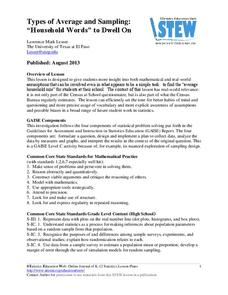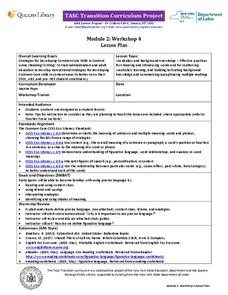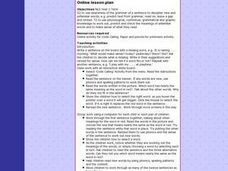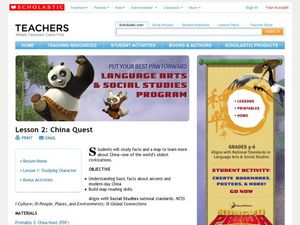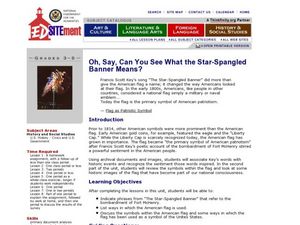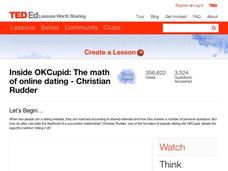Statistics Education Web
Types of Average Sampling: "Household Words" to Dwell On
Show your classes how different means can represent the same data. Individuals collect household size data and calculate the mean. Pupils learn how handling of the data influences the value of the mean.
Prestwick House
Connotative vs. Denotative Meanings
Besides the dictionary definition, words also carry the added weight of meanings that are inferred or implied, meanings conferred on words, or connotations. To gain an understanding the importance of connotation, class members engage in...
EngageNY
End of Unit 1 Assessment: Inferring and Synthesizing (From Two Texts) About Life in Colonial America
Close your colonial America unit with a performance-based assessment. Class members will show their proficiency in several skills including using details to back up inferences, determining the meaning of words in context,...
EngageNY
Sampling Variability in the Sample Proportion (part 1)
Increase your sample and increase your accuracy! Scholars complete an activity that compares sample size to variability in results. Learners realize that the greater the sample size, the smaller the range in the distribution of sample...
Curated OER
ABC Bookmaking Builds Vocabulary In the Content Areas
Students create an ABC book using vocabulary words from content areas. They use each word in context and create an illustration for each word to further demonstrate their knowledge of its meaning.
Curated OER
Introduce Vocabulary: Peter's Chair (Keats)
A new baby means a lot of changes for Peter! Ezra Jack Keats presents this common childhood experience in his story Peter's Chair, the context of a detailed vocabulary study. Before you read, introduce the three new words scholars will...
New York State Education Department
TASC Transition Curriculum: Workshop 4
Why is it important to use precise language? Participants explore this question in the fourth activity in a series of 15 on effective instruction. Perfect for all content areas, the activity promotes appropriate language choice through...
Curated OER
EEEK! A Spider!
Youngsters complete a unit of lessons based on the story "Little Miss Muffet." They predict what will happen in the story, and use context clues to look for meaning in the words. They research information about spiders using the Internet...
Curated OER
Child Safety
Explore reading comprehension and child safety in this young adult literacy lesson plan. High schoolers practice using context clues to figure out word meanings after observing a teacher model this process. They read an article about...
Curated OER
Self-Monitoring Strategies and Vocabulary Games
Middle and high schoolers identify how to discover a word's meaning by exploring context clues and any pictures, diagrams, photographs, and charts that might be included. They continue this process with other examples and locate one on...
EngageNY
Paragraph Writing: The Role of Religion in Colonial America
Informative writing is emphasized in the standards. Help your learners reach that goal with the plan for paragraph writing outlined here. After reviewing the work from the day before and adding to their vocabulary notebooks, class...
Curated OER
Sequence, Predict, Infer: Pink and Say
Practice sequencing with your 2nd graders via Patricia Polacco's Civil War book Pink and Say. Begin with a blindfold and a bag of mystery items. Connect their use of clues to identify what they can't see with the skill of making...
Curated OER
Predicting the Meaning of Unfamiliar Words in a Text
Middle schoolers develop strategies for what to do when they come upon words in a text that they don't know. After a class discussion, pupils are given a selection of text that contains some very difficult words. They are instructed to...
BBC
Code Calling - Working Out New Words
Young readers practice deciphering new words by using context clues and grammatical rules. The online activity embedded in the plan is especially engaging, and should be enjoyable for all pupils who work through it. A good printable...
Curated OER
Because of Winn-Dixie
Readers analyze an excerpt from Kate DiCamillo's novel Because of Winn-Dixie. They read silently, and then hear it read aloud. Definitions for underlined vocabulary words are in the margin, and other potentially difficult words are in...
Curated OER
Parrot in the Oven: Word Tree - Bonsai or Banyan
What fun! As part of a vocabulary exercise designed for Victor Martinez's Parrot in the Oven: Mi Vida readers create word trees with the trunk representing the root word and the branches representing prefixes that can be added to the...
Curated OER
China Quest
Read and research information on China. Young researchers complete a knowledge hunt about China then locate and describe each location using directional words. They recognize the word meaning through context clues and application practice.
National Endowment for the Humanities
Courage “In the Time of the Butterflies”: A Common Core Exemplar
The courage of Las Mariposas, the Mirabal sisters, is the focus of a series of activities designed to accompany a reading of In the Time of the Butterflies that ask readers to consider what it means to be courageous. Beautifully crafted...
Curated OER
Analyzing Unknown Words
Learners analyze affixes and how they affect word meaning. In this language arts lesson, students use charts to construct and deconstruct words to find meaning.
EngageNY
Main Ideas in Informational Text: Analyzing a Firsthand Human Rights Account
Although this is part of a series, lesson plan nine has your class take a break from their close study of the Universal Declaration of Human Rights (UDHR) text to read the firsthand account “Teaching Nepalis to Read, Plant, and Vote” by...
Curated OER
Alexander Hamilton and the Roots of Federalism
Explore the origin of political parties in the United States. Learners work in groups to read and analyze copies of the "Report on Manufactures" written by Alexander Hamilton. Then, they complete a worksheet comparing the Federalists to...
Curated OER
Practicing Sight words
Review sight words with readers. They will look over their sight words and come up with sentences for each of them. They also review the alphabet and identify unfamiliar words.
Curated OER
Oh, Say, Can You See What the Star-Spangled Banner Means?
Students research the historical inspiration for the lyrics of the "The Star Spangled Banner". They explore websites, read articles and analyze poetry in an examination of America's patriotic symbols and history.
Curated OER
Inside OKCupid: The Math of Online Dating
Capture the hearts of your young statisticians with this real-life example of using statistics in online dating. The use of average and geometric mean are discussed in the context of creating the algorithm used to connect people.


